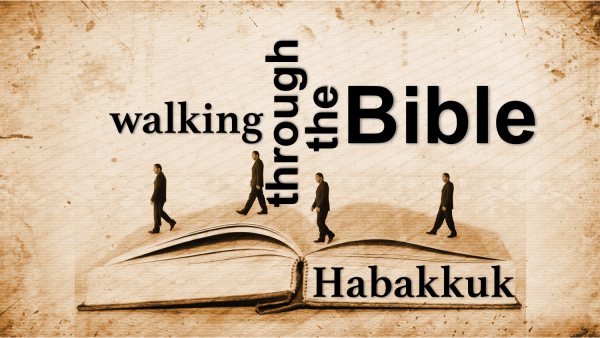The prophet himself is one about whom nothing is known. Habakkuk reveals nothing of himself in this book and there is neither mention of him outside of the book. Where he is from, what he did, and how he ended up a prophet are questions completely unanswered. His name itself is not of Hebrew origin, but his inspired title “the prophet” indicates a possibility that he was a professional prophet. It is apparent that his work was done after the Babylonians’ rise to world power in 612 B.C. but prior to their control of Judah beginning in 606 B.C. Therefore the prophecies recorded in the book were likely pronounced sometime in that time period or shortly thereafter.
In the first verses of the book Habakkuk’s anguish of heart is seen for the extent to which Judah had fallen into sin. He longed for the iniquity to end, even if it took the wrath of God to stop it.
“O Lord, how long shall I cry, and thou wilt not hear! Even cry out unto thee of violence, and thou wilt not save! Why dost thou shew me iniquity, and cause me to behold grievance? For spoiling and violence are before me: and there are that raise up strife and contention. Therefore the law is slacked, and judgment doth never go forth: for the wicked doth compass about the righteous; therefore wrong judgment proceedeth” (Habakkuk 1:2-4).
Habakkuk felt God was leaving sin unpunished, but failed to recognize that His love for His people caused Him to suffer long in hopes of their repentance. That longsuffering, though, has now expired and wherein the prophet believed that if God was going to bring His wrath upon the people He would do it directly, His message to Habakkuk was that the Babylonians would be His agent of judgment upon the people, then they themselves would suffer for their sins. At first Habakkuk underestimated God’s awareness of current events, but he soon realized his error.
Knowing the sins of Judah that brought their demise, the question might arise regarding Babylon’s specific offenses that resulted in theirs. In Habakkuk two, the prophet receives five woes pronounced against the conquering nation by God outlining their guilt. First, in verse six, Habakkuk says, “Woe to him that increaseth that which is not his!” They, without moral right, seized a land not theirs for the sole purpose of building up their empire and for that they would pay. Second, in verse nine, the prophet records, “Woe to him that coveteth an evil covetousness to his house, that he may set his nest on high, that he may be delivered from the power of evil!” With greed as their only motivation the Chaldeans had built their empire through cruelty and godless gain. For their inhumanity they would suffer. Third, in verse twelve, God reveals, “Woe to him that buildeth a town with blood, and establisheth a city by iniquity!” The Chaldeans, in their conquests, built cities with slave labor and viewed life as cheap, thereby ignoring the misery of their captives. Their ungodliness would have its consequences. Fourth, in verse fifteen, upon Babylon was also pronounced, “Woe unto him that giveth his neighbor drink, that puttest thy bottle to him, and makest him drunken also, that thou mayest look on their nakedness!” Not only did these heathen physically assault the well-being of their captives, but also intoxicated them to degrade them for selfish purposes. And finally, in verse nineteen, Habakkuk stated, “Woe unto him that saith to the wood, Awake; to the dumb stone, Arise, it shall teach! Behold, it is laid over with gold and silver, and there is no breath at all in the midst of it.” Lastly, Babylon was guilty as idolaters who rejected the living God for dead and dumb idols. For this and all else, Babylon would not be immune to the judgment of God, but would suffer and be no more.
Christ is pictured in Habakkuk by that which only He could provide, salvation. Three times the word is used in the book (twice in 3:13 and once in 3:18) and with each a prophecy of Christ is pronounced. Through Christ, “…the earth shall be filled with the knowledge of the glory of the Lord, as the waters cover the sea” (Habakkuk 2:14).
As the book closes, Habakkuk engages in a lengthy prayer unto the Father. In the prayer he accomplishes two things. First he seeks the Lord’s mercy upon him for his doubt, and second he praises the power of God that has since time been revealed to him. May our lives be characterized with similar goals. Seek His mercy and praise His power.

